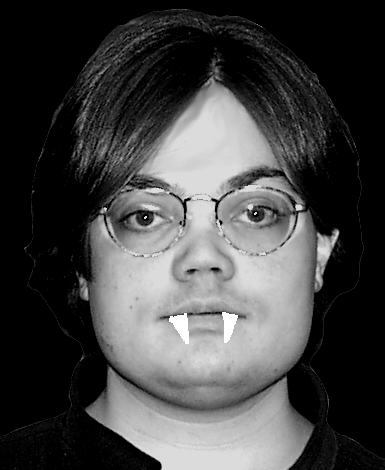
Halloween – what a scary concept
So, I was standing in wet and muddy clothes in front of the facade of a haunted house with some 150-odd people on a rainy Saturday night, trying to avoid slipping in the mud as I circled around a maze of ropes and puddles some 60 miles from my nice, warm, non-muddy, non-smelly bed.
And at some point I began to think to myself: Why the heck am I doing this? Am I so fascinated by some macabre, hedonistic holiday that I actually consider this kind of abuse “entertainment?”
Although Halloween has always been one of my favorite holidays, I’ve never actually asked myself why I consider it such a great holiday. It isn’t a holiday centered around giving, like Christmas. It doesn’t champion friendship and family, like Thanksgiving. There aren’t any cute bunnies or cherubs – just people masquerading as devils, cadavers and superheros, going door to door and asking people to give them candy … or else!
Hmm … a holiday built around people wearing masks, participating in door-to-door extortion, all in the name of an ancient and misunderstood Pagan ritual? Carl Jung, anyone?
My love of Halloween goes back as far as I can remember. There wasn’t a lot of opportunity for trick-or-treating in my neighborhood, but my grade school would hold an annual carnival with corny skill games, inflatable trampolines and an opportunity to meet Dracula himself (with the added benefit of not having to give up your immortal soul in the process). I guess I was too young at the time to actually consider the ramifications of the holiday I was celebrating, but I wasn’t too young to get really ticked off when the church decided to close the whole thing down because it encouraged children to celebrate devilry. (Not that there weren’t other times when the church decided to ruin our fun, but that particular decision sticks out prominently in my mind.)
Of course, now the whole trick-or-treating, dressing up thing is an indoctrinated part of a person’s childhood. (And my Harpo Marx costume was definitely a classic.) But you have to wonder why we decide dressing our children as Superman (or, God forbid, miniature versions of Satan) is alright that single night out of a year. People walking around wearing masks – I think those fine psychological folks in Hyer Hall could find something to say about that.
I’ll get to that whole “mask” part eventually; but before I do, there’s another aspect of Halloween I want to touch on that affected my view of the holiday even more than trick-or-treating.
Even before I cared about movies, I was a classic monster movie nut. I would spend hours poring through the Frankenstein movies; acquainting myself with all the sons, daughters and other relatives of Dracula; getting irritated whenever stupid people let Larry Talbot out of his padlocked room in the Wolfman movies. I suffered through trash like The Devil Bat (“More terrible than bombing by night!”) and through each and every moronic meeting Abbot and Costello had with Frankenstein’s monster, Dr. Jekyll and Mr. Hyde and the Invisible Man.
I learned all of my social skills from classic horror movies – whenever I approach a total stranger, I stomp around like Frankenstein’s monster, moaning, “… Friend? … Friend?” However, I’ve found that the whole clenched-hands, hypnotic stare thing from White Zombie doesn’t really work when you want to get members of the opposite sex to go out with you.
And, of course, I get unreasonably perturbed when people get Ygor and Fritz the hunchbacked dwarf mixed up. And you can often find me shouting for no good reason, “Frankenstein was the doctor, dammit! The monster didn’t have a name! Must you mock my very existence?!”
Now … well, let’s see, the last horror movie I saw was Red Dragon, a movie as repugnant and visceral as any slasher flick out there. I think that movie seriously made me question my whole outlook on horror movies. Basically: Have I been blind this whole time to how little respect most of these movies have for human life, not to mention reality? We have a figure like Hannibal Lecter, who, like your classic Wolfman, pointlessly massacres people, yet seems to elicit more sympathy and fascination than the protagonist. (Readers of the Red Dragon novel can back me up on how little a role Lecter originally had in the whole story.) Shouldn’t I feel just the least bit guilty about indulging in this kind of escapism? Isn’t this like watching the 9 o’clock news and rooting for the guy in the white Ford Bronco?
To a certain extent, I think that we should question how much we revere Halloween, considering that it really holds no political or (direct) religious significance. Certainly there’s nothing wrong with the whole escapism aspect of Halloween. Hey, I’ve been to see The Rocky Horror Picture Show in the theater before; I’ve been to plenty of Jimmy Buffet concerts. If anything that proves to me that people need to throw off the rigors of Puritan morals and indulge in a little hedonism now and then. Maybe that’s what the whole mask thing is for.
But should we consider Halloween as an opportunity to blindly champion the forces of evil? Absolutely not. If there is anything that classic horror movies teach us, it’s that good can’t exist without evil, and that good often triumphs in the end (although good often has the advantage of carrying silver bullets). If anything, Halloween should allow us to examine ourselves, and acknowledge that in each of us, the interplay of light and dark is ultimately what makes us who we are.








